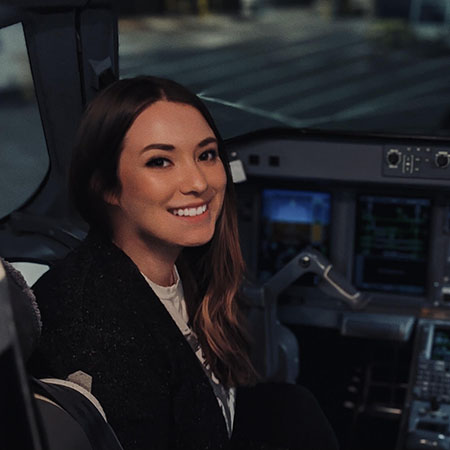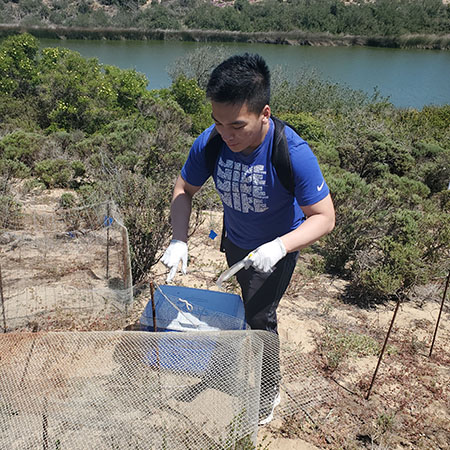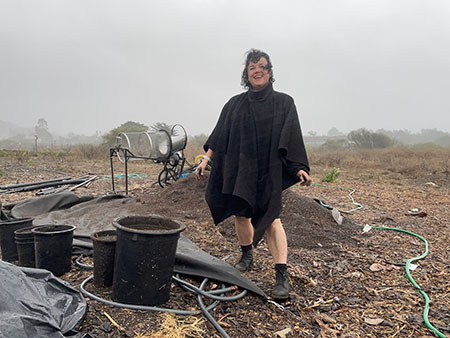Fourth-years Peter Nguyen, Hayley Coyle, and Aja Bond are at the forefront of undergraduate ecology research at UC Santa Cruz. As the first students chosen to participate in The Earth Futures Institute’s newly launched Frontier Fellows program, Nguyen, Coyle, and Bond have ushered in a new wave of innovative and interdisciplinary research focused on preserving Earth’s future.
“For those of us impatient to fix big problems and make a difference in the world, this program gives us the tools to start working, right now,” Coyle said. “It has given me confidence in the research process necessary for me to hit the ground running in graduate school and industry, and whatever lies beyond that.”
Piloted in spring 2022 by astrophysics and astronomy professor emerita, Sandra Faber, the Frontier Fellows program funds undergraduate research for a full year, giving students a unique career-building experience. Faber emphasized the importance of funding and supporting undergraduate research opportunities.
“Research experiences are the most powerful life-changing experiences in education,” Faber said. “The Frontier Fellows program offers an incomparable opportunity—giving undergraduate students an opportunity to spearhead research that inspires them while receiving the funding and mentorship to do so. Students in the Frontier Fellows program are set up for success in their respective interests well after college.”
The Frontier Fellows program would not have been possible without the generosity of UCSC supporter Catherine Hudson-Webb. Hudson-Webb said she was inspired by Faber’s commitment to combating climate change and supporting all biological systems on the planet. After hearing Faber speak about the Frontier Fellows program at a local learning group, Hudson-Webb knew she had to support the program in any way she could.
“I am in despair about the future of our world, though I do what I can to reduce or reverse damage done in my own sphere—but I am just one person,” Hudson-Webb said. “I gather hope in knowing that young people can build upon the ever-evolving world of knowledge and that they may learn as well from our often colossal mistakes as we approach an uncertain future. I am inspired and grateful for the work being done by UCSC’s Frontier Fellows.”
Peter Nguyen, Hayley Coyle, and Aja Bond
Nguyen (Rachel Carson ’22, ecology and evolutionary biology) is studying the effects of climate change on the growth and reproduction of Lupinus nipomensis, a federally listed endangered flowering plant. With a permit from the U.S. Fish and Wildlife Service and funding from UC Santa Cruz’s Earth Futures Institute Frontier Fellows program, Nguyen is on the front lines of groundbreaking exploratory research in ecology at UCSC.
“The Frontiers Fellow Program is important to me because it allowed me to explore the world of biology by pursuing a research project that would have been unfeasible if not for the support of the program,” Nguyen said. “This research is important to me on a personal level because I am very passionate about biodiversity conservation. Earth is experiencing a mass extinction of biodiversity, and this research project showed me there is a lot of work for us to do if we want to save our planet.”
Nguyen uses eDNA techniques to identify potential microbial communities that may be supporting the species' success during intensified climate scenarios and reintroduction efforts. He’s hopeful that this conservation model can be used for other species as well, to protect the biodiversity of the planet.
Nguyen isn’t alone in the pursuit of undergraduate research. Fourth year Frontier Fellows Bond (Cowell ’23, art and history of art and visual culture) and Coyle (Crown ’23, applied mathematics) are also pursuing their own undergraduate research using funding from the Earth Futures Institute.
Coyle is a fourth year in the Applied Mathematics B.S. program in the Baskin School of Engineering. She is a returning student to UCSC after having spent the last nine years working at two separate VC-funded technology startups in the Bay Area and the Midwest. She hopes to pursue a graduate degree in statistics immediately following graduation and then apply her education in data science, machine learning, and statistics to build a medical science startup focused on bioinformatics.
“When I first heard about the FF program, I jumped at the opportunity to apply as soon as possible,” Coyle said. “I really felt like this program was going to allow me to obtain the mentorship, publications, and research experiences necessary to move on to graduate school, and then eventually, excel in industry with the eventual goal being to bring urgently called-for solutions to this increasingly complex and troubling world.”
Coyle’s research assesses plant disease in California shrublands using machine learning and high-resolution drone imagery for climate-ready conservation planning. With her co-author, environmental studies P.h.D candidate Jon Detka, Coyle’s primary goal is to publish a manuscript on the application of drones and machine learning to assess plant disease impacts in drought-stressed California maritime chaparral.
“What sets the FF program apart is that it really allows students like me to step into the driver's seat and take control of their own research goals and academic future in a way that simply interning on an existing project does not,” Coyle said.
Double majoring in studio art and the history of art and visual culture, Aja Bond is working across these two disciplines to explore the intersections of soil and compost and of death and grief. With advisors Jorgge Menna-Baretto and Kyle Parry and collaborators Annette Marines, Judit Camacho, and Ed Shanken, Bond asks what we can learn, see, or make visible by counter-mapping the campus as if it were an ecosystem by focusing on food production, consumption, and waste.
Her research uses a variety of approaches including walking, photography, and interviews to see what “loops” of production, consumption, waste, and decomposition emerge and how they can be made more legible through artistic and visual culture practices.
Bond hopes to continue on at UCSC in the new Social Practice and Environmental Art MFA and afterwards get her masters in library and information science to work in libraries, collections, archives, curation, and programming related to art.
“The focus of the Earth futures fellowship could not be more important—empowering and challenging undergrad students to work through long-term research problems with faculty and staff from a variety of disciplines that address the future of the planet in the midst of so many crises—climate being perhaps the largest ever faced,” Bond said. “I feel that this fellowship is perfectly suited to me and my concerns, and is allowing me to build very meaningful professional relationships with my collaborators.”
Bond said she was grateful for the opportunity to spearhead her own interdisciplinary research at UCSC.
“UCSC is a place where this kind of scholarship thrives, and I was drawn to the school for this very reason.”





